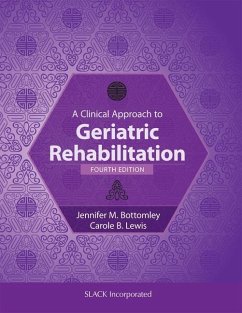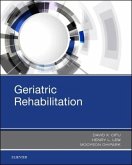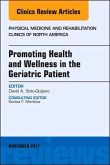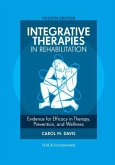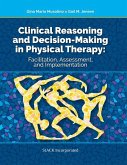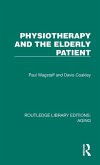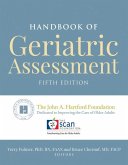- Gebundenes Buch
- Merkliste
- Auf die Merkliste
- Bewerten Bewerten
- Teilen
- Produkt teilen
- Produkterinnerung
- Produkterinnerung
The field of geriatric rehabilitation is constantly changing due to the discovery of new evidence-based evaluation and treatment strategies, as well as the continual support or refutation of older theories and practices.
Andere Kunden interessierten sich auch für
![Geriatric Rehabilitation Geriatric Rehabilitation]() Jennifer BottomleyGeriatric Rehabilitation114,99 €
Jennifer BottomleyGeriatric Rehabilitation114,99 €![Geriatric Rehabilitation Geriatric Rehabilitation]() David X. CifuGeriatric Rehabilitation120,99 €
David X. CifuGeriatric Rehabilitation120,99 €![Promoting Health and Wellness in the Geriatric Patient, an Issue of Physical Medicine and Rehabilitation Clinics of North America Promoting Health and Wellness in the Geriatric Patient, an Issue of Physical Medicine and Rehabilitation Clinics of North America]() David A. Soto-QuijanoPromoting Health and Wellness in the Geriatric Patient, an Issue of Physical Medicine and Rehabilitation Clinics of North America131,99 €
David A. Soto-QuijanoPromoting Health and Wellness in the Geriatric Patient, an Issue of Physical Medicine and Rehabilitation Clinics of North America131,99 €![Integrative Therapies in Rehabilitation Integrative Therapies in Rehabilitation]() Carol M DavisIntegrative Therapies in Rehabilitation113,99 €
Carol M DavisIntegrative Therapies in Rehabilitation113,99 €![Clinical Reasoning and Decision Making in Physical Therapy Clinical Reasoning and Decision Making in Physical Therapy]() Gina MusolinoClinical Reasoning and Decision Making in Physical Therapy109,99 €
Gina MusolinoClinical Reasoning and Decision Making in Physical Therapy109,99 €![Physiotherapy and the Elderly Patient Physiotherapy and the Elderly Patient]() Paul WagstaffPhysiotherapy and the Elderly Patient136,99 €
Paul WagstaffPhysiotherapy and the Elderly Patient136,99 €![Handbook of Geriatric Assessment Handbook of Geriatric Assessment]() Terry FulmerHandbook of Geriatric Assessment115,99 €
Terry FulmerHandbook of Geriatric Assessment115,99 €-
-
-
The field of geriatric rehabilitation is constantly changing due to the discovery of new evidence-based evaluation and treatment strategies, as well as the continual support or refutation of older theories and practices.
Hinweis: Dieser Artikel kann nur an eine deutsche Lieferadresse ausgeliefert werden.
Hinweis: Dieser Artikel kann nur an eine deutsche Lieferadresse ausgeliefert werden.
Produktdetails
- Produktdetails
- Verlag: Taylor & Francis
- 4th edition
- Seitenzahl: 528
- Erscheinungstermin: 1. Februar 2020
- Englisch
- Abmessung: 287mm x 224mm x 38mm
- Gewicht: 1656g
- ISBN-13: 9781630913274
- ISBN-10: 1630913278
- Artikelnr.: 58703374
- Herstellerkennzeichnung
- Libri GmbH
- Europaallee 1
- 36244 Bad Hersfeld
- gpsr@libri.de
- Verlag: Taylor & Francis
- 4th edition
- Seitenzahl: 528
- Erscheinungstermin: 1. Februar 2020
- Englisch
- Abmessung: 287mm x 224mm x 38mm
- Gewicht: 1656g
- ISBN-13: 9781630913274
- ISBN-10: 1630913278
- Artikelnr.: 58703374
- Herstellerkennzeichnung
- Libri GmbH
- Europaallee 1
- 36244 Bad Hersfeld
- gpsr@libri.de
Jennifer M. Bottomley, PT, MS, PhD2 has a bachelor's degree in physical therapy from the University of Wisconsin, Madison, and an advanced master's degree in physical therapy from the Massachusetts General Hospital Institute of Health Professions in Boston. She has a combined intercollegiate doctoral degree in gerontology (University of Massachusetts) and health science and service administration (Union Institute) and a second PhD in health service administration, legislation, and policy management with a specialty in gerontology (Union Institute). Dr. Bottomley has practiced since 1974 in acute care, home care, outpatient clinics, nursing homes, and long-term care facilities. She is an academic and clinical educator in geriatric physical therapy internationally and throughout the United States. In July 2019, Jennifer retired as an associate professor at Simmons University, where she taught the neuromuscular, geriatric, and service learning courses. She continues to serve as an adjunct professor at Simmons University and at the Massachusetts General Hospital Institute. She serves as a consultant on several federal advisory boards, including an appointment to the White House Advisory Panel for Health Care Reform. She practices clinically in the Boston area in homeless shelters on a pro bono basis, coordinating rehabilitation services for the Committee to End Elder Homelessness/HEARTH in Boston and serves on the Board of Directors for HEARTH. Jennifer completed 2 terms as president for the International Association of Physiotherapists Working With Older People, a geriatric specialty group of the World Confederation for Physical Therapy (WCPT), in June 2019. She is currently serving on an interdisciplinary AARP panel addressing elder isolation-identification and interventions. Jennifer is the recipient of numerous awards, the most recent being an International Service Award from the WCPT in June 2019. Carole B. Lewis, PT, DPT, GCS, GTC, MPA, MSG, PhD, FSOAE, FAPTA has been a physical therapist since 1975. Dr. Lewis has worked in home health, long-term care, acute hospitals, rehabilitation departments, and outpatient clinics. She started a private practice in Washington, DC, in 1981 and continues to work as a clinician. In 1979, Dr. Lewis received her 2 master's degrees in health care management and gerontology from the University of Southern California. In 1983, she received her PhD from the University of Maryland in health education, and she received her DPT from Massachusetts General Hospital Institute of Health Professions in 2007. She currently serves on the medical faculty at George Washington University as an adjunct professor in the Department of Geriatrics and is the president of Great Seminars and Books and Great Seminars Online. Dr. Lewis has extensive publications in the field of aging. Her articles have been published in the Journal of the American Physical Therapy Association, Geriatrics, Geritopics, and Senior Patient. She is also editor of the journal Topics in Geriatric Rehabilitation, which won the Association of American Publishers Award for the Most Outstanding Issue of a Scientific Journal. In addition to her articles and journals, Dr. Lewis has written numerous textbooks on aging, such as Geriatric Clinical Strategies, Geriatric Physical Therapy, Geriatric Rehabilitation, Orthopedic Assessment and Treatment of the Geriatric Patient, The Geriatric Exercise Kit, The Functional Toolbox I & II, The Balance Book and Osteoporosis Exercise Book, as well as the Prevention and Wellness Toolbox , Orthopedic Outcome Toolbox, Health Promotion and Exercise for Older Adults, and Improving Mobility in Older Persons. She also coauthored a book for the lay public entitled Age-Defying Fitness. She is also the coeditor of the first exclusive ebook in rehabilitation, Physical Therapy for the Older Adult: Examination and Intervention: An Evidence Based Approach. Her accomplishments include receiving the American Physical Therapy Association (APTA) Lucy Blair Service Award and the Academy of Geriatrics' highest honor, the Joan Mills Award, as well as the Section on Geriatrics' Clinical Excellence Award, and she is a Catherine Worthingham Fellow for the APTA. She was also chosen among the 10 Outstanding Young Women in America and was chosen to be a Fulbright Scholar. She is the 2014 recipient of the Gerontological Society of America Excellence in Rehabilitation of Aging Persons Award and the 2016 Mary McMillan lecturer, the highest honor in the APTA. In 2019, she received the distinct honor of having an annual Carole B. Lewis Lecture as a lifetime achievement award from the Academy of Geriatric Physical Therapy. Dr. Lewis has lectured extensively, speaking in 49 states and internationally, including in Australia, New Zealand, Japan, Finland, Canada, Israel, China, Egypt, The Netherlands, and Turkey.
Part I: Applied Gerontological Concepts Chapter 1: Demographics of Aging
Chapter 2: Comparing and Contrasting the Theories of Aging Chapter 3:
Age-Related Changes in Physiology and Function Chapter 4: Describing
Psychosocial Aspects of Aging Chapter 5: Pathological Manifestations of
Aging Chapter 6: Exploring Nutritional Needs Chapter 7: Geriatric
Pharmacology Chapter 8: Principles and Practice of Geriatric Rehabilitation
Chapter 9: Patient Evaluation Chapter 10: Functional Assessment Chapter 11:
Orthopedic Considerations Part II: Patient Care Concepts Chapter 12:
Neurologic Considerations Chapter 13: Cardiopulmonary and Cardiovascular
Considerations Chapter 14: Integumentary Considerations Chapter 15:
Establishing Community-Based Screening Programs Chapter 16: Communication
Part III: Administration and Management Chapter 17: Attitudes, Ethics, and
Legal Topics in Gerontology Chapter 18: Education and the Older Adult:
Learning, Memory, and Intelligence Chapter 19: Administration of Geriatric
Services Chapter 20: Consultation and Research
Chapter 2: Comparing and Contrasting the Theories of Aging Chapter 3:
Age-Related Changes in Physiology and Function Chapter 4: Describing
Psychosocial Aspects of Aging Chapter 5: Pathological Manifestations of
Aging Chapter 6: Exploring Nutritional Needs Chapter 7: Geriatric
Pharmacology Chapter 8: Principles and Practice of Geriatric Rehabilitation
Chapter 9: Patient Evaluation Chapter 10: Functional Assessment Chapter 11:
Orthopedic Considerations Part II: Patient Care Concepts Chapter 12:
Neurologic Considerations Chapter 13: Cardiopulmonary and Cardiovascular
Considerations Chapter 14: Integumentary Considerations Chapter 15:
Establishing Community-Based Screening Programs Chapter 16: Communication
Part III: Administration and Management Chapter 17: Attitudes, Ethics, and
Legal Topics in Gerontology Chapter 18: Education and the Older Adult:
Learning, Memory, and Intelligence Chapter 19: Administration of Geriatric
Services Chapter 20: Consultation and Research
Part I: Applied Gerontological Concepts Chapter 1: Demographics of Aging
Chapter 2: Comparing and Contrasting the Theories of Aging Chapter 3:
Age-Related Changes in Physiology and Function Chapter 4: Describing
Psychosocial Aspects of Aging Chapter 5: Pathological Manifestations of
Aging Chapter 6: Exploring Nutritional Needs Chapter 7: Geriatric
Pharmacology Chapter 8: Principles and Practice of Geriatric Rehabilitation
Chapter 9: Patient Evaluation Chapter 10: Functional Assessment Chapter 11:
Orthopedic Considerations Part II: Patient Care Concepts Chapter 12:
Neurologic Considerations Chapter 13: Cardiopulmonary and Cardiovascular
Considerations Chapter 14: Integumentary Considerations Chapter 15:
Establishing Community-Based Screening Programs Chapter 16: Communication
Part III: Administration and Management Chapter 17: Attitudes, Ethics, and
Legal Topics in Gerontology Chapter 18: Education and the Older Adult:
Learning, Memory, and Intelligence Chapter 19: Administration of Geriatric
Services Chapter 20: Consultation and Research
Chapter 2: Comparing and Contrasting the Theories of Aging Chapter 3:
Age-Related Changes in Physiology and Function Chapter 4: Describing
Psychosocial Aspects of Aging Chapter 5: Pathological Manifestations of
Aging Chapter 6: Exploring Nutritional Needs Chapter 7: Geriatric
Pharmacology Chapter 8: Principles and Practice of Geriatric Rehabilitation
Chapter 9: Patient Evaluation Chapter 10: Functional Assessment Chapter 11:
Orthopedic Considerations Part II: Patient Care Concepts Chapter 12:
Neurologic Considerations Chapter 13: Cardiopulmonary and Cardiovascular
Considerations Chapter 14: Integumentary Considerations Chapter 15:
Establishing Community-Based Screening Programs Chapter 16: Communication
Part III: Administration and Management Chapter 17: Attitudes, Ethics, and
Legal Topics in Gerontology Chapter 18: Education and the Older Adult:
Learning, Memory, and Intelligence Chapter 19: Administration of Geriatric
Services Chapter 20: Consultation and Research

